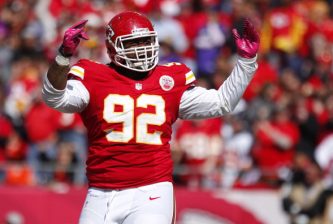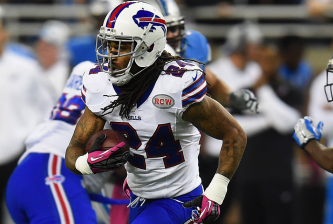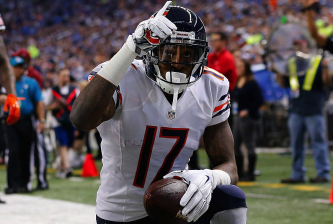By early April of 2013, the pre-NFL draft antics of “which teams wanted which quarterbacks” had begun to vanish. The secret was out: no one really liked ANY of the passers in the class. The favorite among most outside of the NFL was West Virginia’s Geno Smith, but his college offense limitations and attitude concerns didn’t offer a glowing report. Despite his concerns, he was the only quarterback that had waded past Matt Barkley and the rest of the over-hyped passers of the class to still be in first-round discussion.
The day before the draft, I was told by an NFL source to “watch EJ Manuel”, saying that team’s valued his attitude toward developing and his impressive workouts, “including the Bills”. As the draft unfolded, the Bills traded down and selected EJ Manuel in the mid-first round. Astounding most draft onlookers (and probably more than a few NFL teams), the Bills new regime had invested in their new “quarterback of the future”.
Geno Smith wasn’t selected in the first-round, and made his frustrations toward NFL teams and his agent well known, as he nearly left New York City after Day 1 of the draft (he would go on to fire his agent shortly after the draft). The Jets stopped his free fall, scooping him up in the second-round and giving him the first crack at supplanting Mark Sanchez.
Skipping ahead to the beginning of this year, the Bills, optimistic of their playoff chances, started EJ Manuel, who’s confidence reportedly had grown substantially over the off-season. The Jets moved on from Mark Sanchez and had invested fully in Geno Smith as their team’s passer.
Now, both are out of a job.
The 2013 class was poor. And if there’s any lesson to be gained for NFL teams, it’s one that has been around for many years: Don’t force a quarterback in the draft. Drafting for need is always a bad idea, and selecting a quarterback too high is the worst way to accomplish it.
Especially for first-round quarterbacks (and in Geno Smith’s case, one that was perceived to be first-round talent), the pressure is enormous to succeed, and succeed early in their NFL careers, despite the talent around them. Teams need to protect themselves from ruining a quarterback who’s talents and make-up might be worth a high draft pick, but the situation they’re entered into is set up for failure.
I believe the most classic examples of this are David Carr landing in Oakland and Blaine Gabbert being drafted by the Jaguars. Those two quarterbacks entered two of the worst rosters in NFL history, with limited support from playmakers and blocking in the offense and coaching staffs that had no clear plan on how to use them effectively. For Carr, he was sacked out of the league despite having gaudy talent, leaving fans (and David himself) to only wonder “What if” he hadn’t been forced into the starting lineup.
And for Gabbert, for all his weaknesses fans and teams should have noticed pre-draft, still offered plenty of upside. However, upon his drafting, I immediately felt a sense of regret placing him in the upper echelon of the quarterback rankings: he was doomed to fail. With no stability in the organization, few pieces around him on offense and a team that was expected to force him into the lineup way to fast, the high-upside but development-needy Gabbert was a bust the second he started a game for the Jaguars if the first-half of the NFL season.
If Carr and Gabbert are any indication, both Manuel and Smith are doomed for lifes of sporadic back-up jobs. For Carr, he began to take the mantle of the veteran back-up, but his mental capacity is what kept him around so long. The 49ers traded for Gabbert, but that’s likely a trial period to see if they can reclaim his top talent at Missouri.
For Manuel and Smith, neither boast top-end mental capacity, and are just two years removed from college. Sure, they’re talented and still have upside, but there aren’t many suitors for second-team developmental projects.
Manuel has said all the right things since his benching, which should give him a second chance in the NFL. His understanding of his demotion and reported attitude in practice likely has resonated with others in the Bills organization. While it’s possible a team with an unstable quarterback competition next year (Oakland, Houston or St. Louis) or in need of a new back-up with some upside (San Diego, Pittsburgh, or Carolina), it could be a team that brings in a member of the Bills front office or coaching staff to their organization that vouches for his character.
As for Smith, he likely hasn’t made a ton of great connections in his time in the NFL. His attitude in the media and behind closed doors hasn’t been nearly at the level of Manuel, but his flashes have been more pronounced. That being said, he likely hasn’t won over GM John Idzik or head coach Rex Ryan this year, so in the event they are fired, they likely won’t covet him on their respective next stops. That means it’ll take a Gabbert-like situation for a team to trade for Smith, or he may struggle to find a job in the NFL altogether.
Smith and Manuel will serve as reminders to NFL teams that drafting a quarterback early is never an easy task, and should not be taken lightly. Not only does that quarterback require a near-season’s worth of snaps to show you what you’ve got, but he could get you fired (Jets) or starting Kyle Orton (Bills) in short time.
It’s been unique to see two quarterbacks less than two years into their careers already benched, and looking ahead to who their SECOND team might be. But that’s the beast of today’s NFL. Quarterbacks are expected and required to play early, and play well early, or else risk being benched and forgotten about. Geno Smith and EJ Manuel have tough roads to become unforgotten before their NFL careers are through, because they’re teams appear through with them already.




